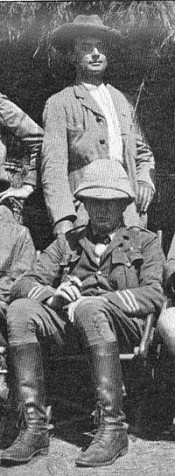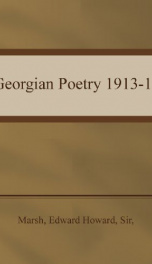Marsh Edward Howard Sir

Sir Edward Howard Marsh (18 November 1872 – 13 January 1953), born to Professor Howard Marsh of Downing College, Cambridge, was a British polymath, translator, arts patron and civil servant. He was the sponsor of the Georgian school of poets and a friend to many individuals, including Rupert Brooke and Siegfried Sassoon. In his career as a civil servant he worked as Private Secretary to a succession of Great Britain's most powerful ministers, particularly Winston Churchill. In 1896 he was appointed Assistant Private Secretary to Joseph Chamberlain, the Colonial Secretary. When Chamberlain resigned in in 1903, Marsh became private secretary to his successor, Alfred Lyttelton. When Winston Churchill became Under-Secretary of State for the Colonies in 1905 during Henry Campbell-Bannerman's first Government, Marsh became Churchill's Private Secretary, beginning an association and friendship that would last through Marsh's death. Marsh would be Churchill's Private Secretary for the next ten years, until Churchill left the Government in 1915. As Randolph Churchill put it, from December 1905, "Marsh was to accompany Churchill to every Government department he occupied: to the Board of Trade, the Home Office, the Admiralty, the Duchy of Lancaster, the Ministry of Munitions, the War Office, back to his original Colonial Office and the Treasury."[1] These moves were somewhat irregular as Marsh remained, until 1937, officially a clerk at the Colonial Office, but many exceptions were made, possibly at cost to Marsh's official advancement. When Churchill left government for the first time in 1915, Marsh became Assistant Private Secretary to Prime Minister Henry Asquith, in which position he would serve until the fall of Asquith's government in December, 1916. When Churchill returned to government as Minister of Munitions in 1916, Marsh joined him there as Private Secretary and worked in that position, through successive departments, until the fall of David Lloyd George's Coalition Government in 1922. When Churchill became Chancellor of the Exchequer in 1924, Marsh joined him there as Private Secretary and remained at the Treasury until the fall of Stanley Baldwin's second government in 1929, when Marsh was returned to work at the Colonial Office. He then served as Private Secretary to every Secretary of State for the Colonies from 1929 until his retirement in 1937. A classical scholar and translator, Marsh edited five anthologies of Georgian Poetry between 1912 and 1922, and he became Rupert Brooke's literary executor, editing his Collected Poems in 1918. He was also a consistent collector and supporter of the works of the avant-garde artists Mark Gertler, Duncan Grant, David Bomberg and Paul Nash, all of whom were also associated with the Bloomsbury Group. In addition to his work editing Churchill's writing while the latter was in or out of government, Marsh introduced Siegfried Sassoon to Churchill as a means of aiding the former's career. He was also a close friend of Ivor Novello. In 1939, he produced A Number of People, a memoir of his life and times containing his memories of those writers and politicians with whom he had associated.
do you like this author?
What readers are saying
What do you think? Write your own comment on this book!
write a commentWhat readers are saying
What do you think? Write your own comment on this author!
write a commentBook list

Georgian Poetry 1913-15
Series:
Unknown
Year:
Unknown
Raiting:
4/5
[The scene is a bedchamber in a one-storied house. The walls consist ofa few courses of huge irregular boulders roughly squared and fittedtogether; a thatched roof rises steeply from the back wall. In thecentre of the back wall is a doorway opening on a garden and covered bytwo leather curtains; the chamber is partially hung with similarhangings stitched with bright wools. There is a small window on eachside of this door.Toward the front a bed stands with its head against the right wall; ithas thin leather curtains hung by thongs and drawn back. Farther forwarda rich robe and a crown hang on a peg in the same wall. There is asecond door beyond the bed, and between this and the bed's head stands asmall table with a bronze lamp and a bronze cup on it. Queen HYGD, anemaciated woman, is asleep in the bed; her plenteous black hair, veinedwith silver, spreads over the pillow. Her waiting-woman, MERRYN,middle-aged and hard-featured, sits watching her in a chair on thefarther side of the bed. The light of early morning fills the room.]Merryn: Many, many must die who long to live, Yet this one cannot die who longs to die: Even her sleep, come now at last, thwarts death, Although sleep lures us all half way to death ... I could not sit beside her every night If I believed that I might suffer so: I am sure I am not made to be diseased, I feel there is no malady can touch me-- Save the red cancer, growing where it will.[Taking her beads from her girdle, she kneels at the foot of the bed.] O sweet Saint Cleer, and sweet Saint Elid too, Shield me from rooting cancers and from madness: Shield me from sudden death, worse than two death-beds; Let me not lie like this unwanted queen, Yet let my time come not ere I am ready-- Grant space enow to relish the watchers' tears And give my clothes away and calm my features And streek my limbs according to my will, Not the hard will of fumbling corpse
Show more
add to favoritesadd In favorites
Book list

Georgian Poetry 1913-15
Series:
Unknown
Year:
Unknown
Raiting:
4/5
[The scene is a bedchamber in a one-storied house. The walls consist ofa few courses of huge irregular boulders roughly squared and fittedtogether; a thatched roof rises steeply from the back wall. In thecentre of the back wall is a doorway opening on a garden and covered bytwo leather curtains; the chamber is partially hung with similarhangings stitched with bright wools. There is a small window on eachside of this door.Toward the front a bed stands with its head against the right wall; ithas thin leather curtains hung by thongs and drawn back. Farther forwarda rich robe and a crown hang on a peg in the same wall. There is asecond door beyond the bed, and between this and the bed's head stands asmall table with a bronze lamp and a bronze cup on it. Queen HYGD, anemaciated woman, is asleep in the bed; her plenteous black hair, veinedwith silver, spreads over the pillow. Her waiting-woman, MERRYN,middle-aged and hard-featured, sits watching her in a chair on thefarther side of the bed. The light of early morning fills the room.]Merryn: Many, many must die who long to live, Yet this one cannot die who longs to die: Even her sleep, come now at last, thwarts death, Although sleep lures us all half way to death ... I could not sit beside her every night If I believed that I might suffer so: I am sure I am not made to be diseased, I feel there is no malady can touch me-- Save the red cancer, growing where it will.[Taking her beads from her girdle, she kneels at the foot of the bed.] O sweet Saint Cleer, and sweet Saint Elid too, Shield me from rooting cancers and from madness: Shield me from sudden death, worse than two death-beds; Let me not lie like this unwanted queen, Yet let my time come not ere I am ready-- Grant space enow to relish the watchers' tears And give my clothes away and calm my features And streek my limbs according to my will, Not the hard will of fumbling corpse
Show more
add to favoritesadd In favorites
What readers are saying
What do you think? Write your own comment on this author!
write a commentif you like Marsh Edward Howard Sir try:
readers also enjoyed
What readers are saying
What do you think? Write your own comment on this author!
write a commentif you like Marsh Edward Howard Sir try:
readers also enjoyed
Do you want to exchange books? It’s EASY!
Get registered and find other users who want to give their favourite books to good hands!

